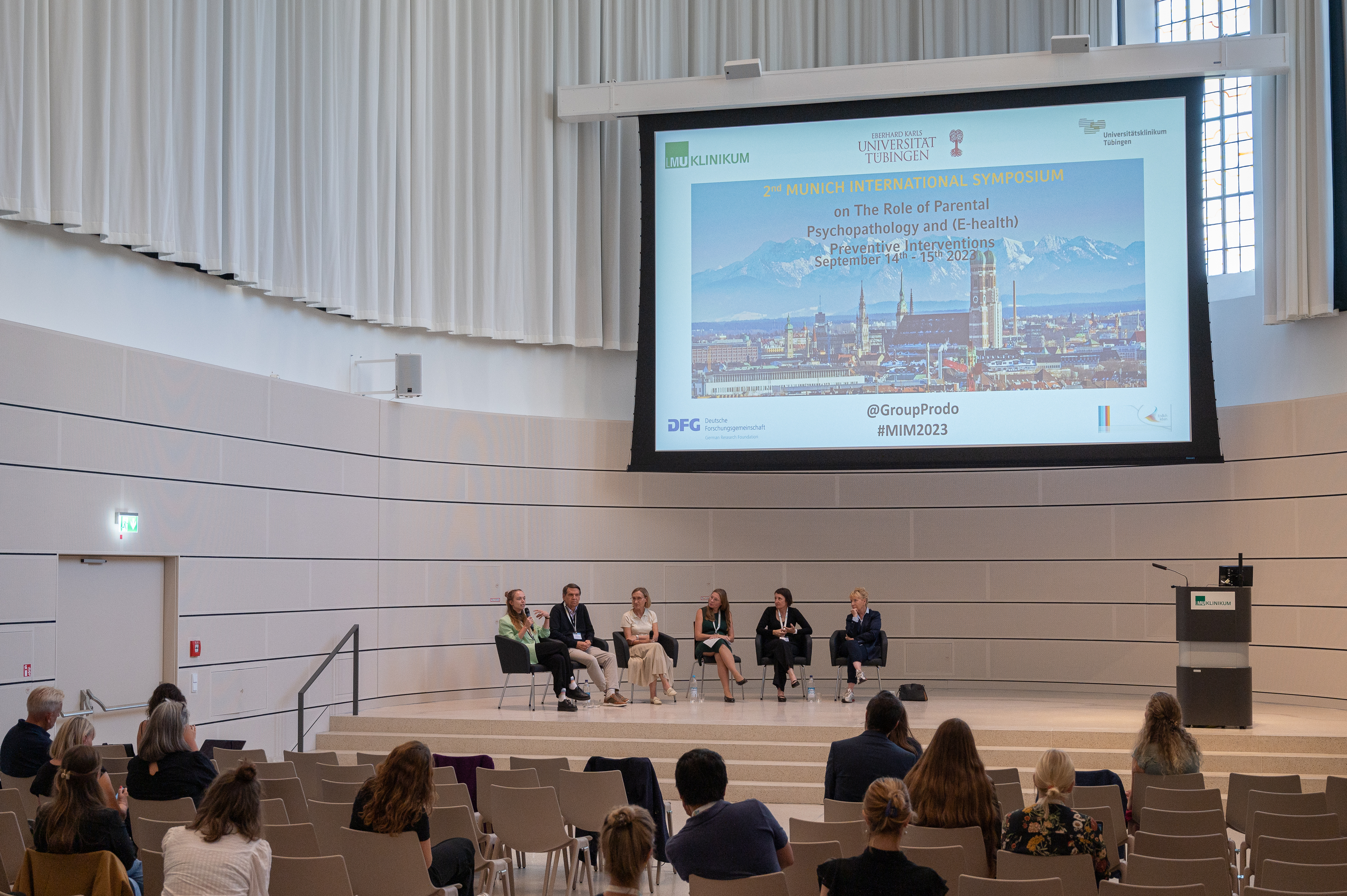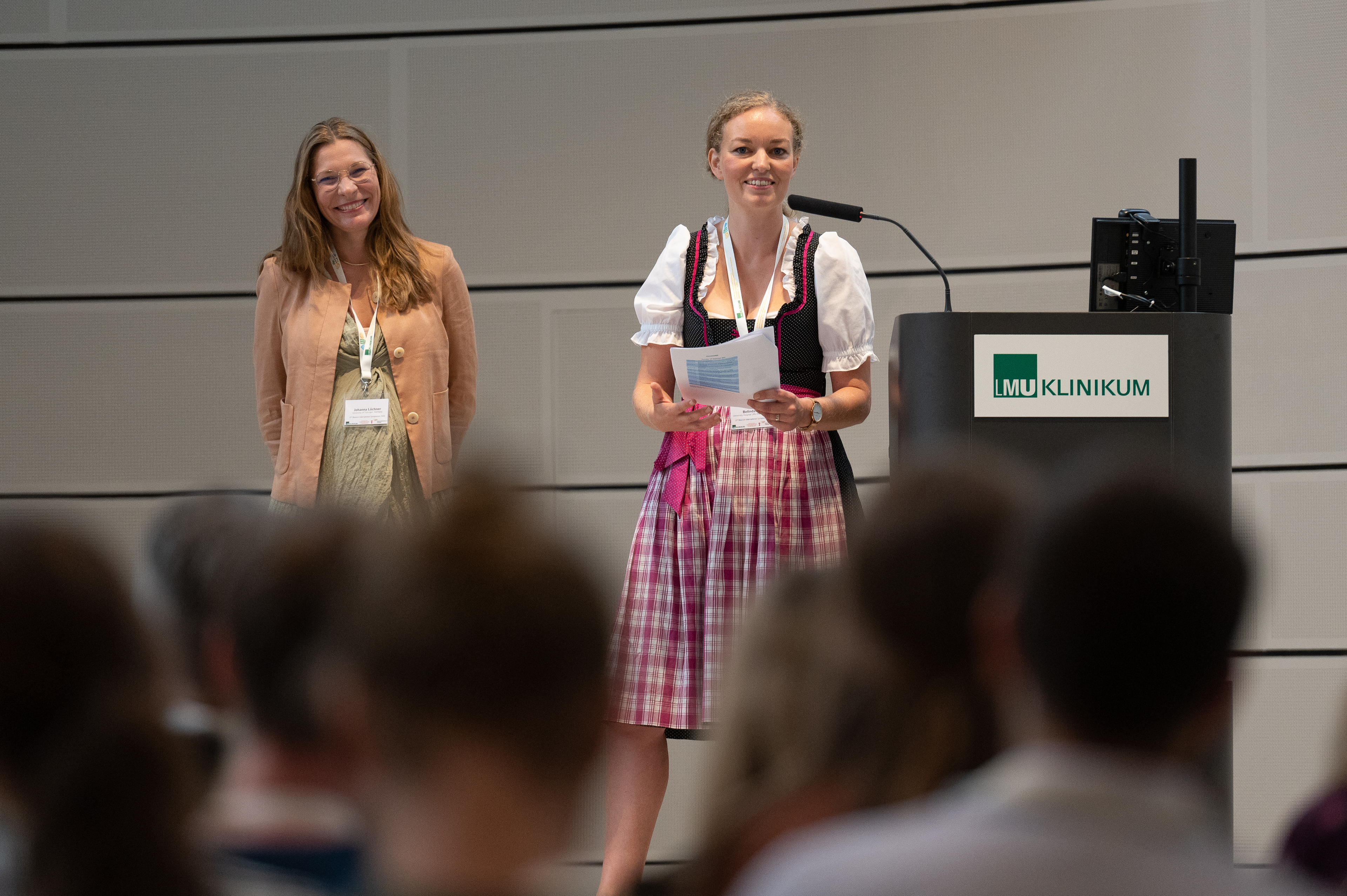Parental mental illnessand preventive interventions for childrenHere are Belinda's slides from a talk in Prof. Julian Schmitz's lab on 18.06.2025 Here are Belinda's slides from a talk in Saskia Scholten's group on 09.07.2025 Pint of Science (19.05.2025)Belinda gave a talk entitled "Passing on the half-empty glass: the effect of depression on parenting". Her slides are here. 2nd Munich International Symposiumon Parental Psychopathology and (E-health) Preventive InterventionsOn September 14-15th 2023 Johanna Löchner, Gerd Schulte-Körne and Belinda Platt (with help from Laura Ullrich and Carolina Silberbauer) hosted the 2nd Munich International Symposium on Parental Psychopathology. The meeting was financially supported by the DFG (Grant Nr. 527114965) and the Department of Child and Adolescent Psychiatry at the LMU Munich. The final programme is available here. In the blog below two members of the PRODO research group describe what they took away from the meeting.
Like parent, like child? Exploring the Impact of Parental Psychopathology and (E-Health) Preventive Interventions Gina Schowe and Franziska Auer (29.09.2023) In today’s digital age, where the boundaries of knowledge and innovation are constantly expanding, we find ourselves at the intersection of groundbreaking research and transformative solutions. Mental health has become an increasingly important topic, especially as of late. But how can we prevent a mental health crisis in an ever-changing world? What role plays the transgenerational transmission of mental health issues? The findings presented in the Munich International Symposium 2023 delved into the intricate web of factors influencing the mental health of our future generations, offering insights into pioneering preventive interventions, specifically targeting the at-risk offspring of parents with mental health issues. The insights presented by our expert speakers were not only extremely informative and engaging but also inspiring, creating a space for exchange, discussion, and networking. A program filled with interactive elements, such as scientific speed dating (facilitating the forming of research collaborations), or a clinical roundtable that invited all participants to share and argue their viewpoints, has created a captivating atmosphere, promoting the communication of the newest advances regarding the role of parental psychopathology and (E-health) preventive interventions. Here you can find a short overview of the talks at the Munich International Symposium 2023 with links to the speakers' slides: Transgenerational Risk Factors in the Transmission of Depression Depression, with its far-reaching impact, is often more than just an individual struggle; it can be a legacy passed from one generation to the next. Prof. Brandon Gibb (Binghamton University, USA) researches the intricacies of transgenerational risk factors and how they contribute to the transmission of depression, showing that avoiding their parents' sad expressions may be a form of emotion regulation for children of parents with depression. You can view a recording of Brandon's talk here. Transition to Parenthood: Obstacles The journey to parenthood is a profound transformation, but it's not without its obstacles. In the symposium on the transition to parenthood and its obstacles, chair Prof. Anna-Lena Zietlow (TU Dresden, Germany), Prof. Kate Humphreys (Vanderbilt University, USA), and Prof. Sabine Walper (German Youth Institute (DJI), Germany) focused on the challenges that parents face as they embark on this life-altering journey, and how these hurdles can affect not only their own mental health but also that of their children. Our experts shared their research, including findings on the influence parental stress could have on a child’s regulatory issues and whether neurofeedback training might help overcome parental bonding difficulties. Sabine's talk is available to watch here. Searching for Mediators in Preventive Interventions: Prevention is key, especially when it comes to the mental well-being of our children. Prof. Bruce Compas (Vanderbilt University, USA) argued that we need to understand the critical mediators underlying interventions for offspring of parents with depression and showed that emotion regulation and coping can be improved via the “FGCB” intervention (family group cognitive behavioral preventive intervention). You can watch Bruce's talk here. The Role of Emotion Regulation in Transgenerational Transmission Emotion regulation is a critical aspect of mental health. Our second symposium chaired by Prof. Bonnie Klimes-Dougan (University Minnesota, USA), alongside Dr. Anca Sfärlea (University Hospital LMU Munich, Germany), Prof. Autumn Kujawa (Vanderbilt University, USA) and Prof. Katie Burkhouse (Nationwide Children’s Hospital Ohio, USA), explored how effective emotion regulation plays a pivotal role in breaking the cycle of transgenerational transmission of psychopathology. The presented findings suggest emotion regulation as a mediator in the relationship between cognitive biases and depressive symptoms. You can watch this symposium here. E-mental Health possibilities for Preventing and Intervention in the Young In today's tech-savvy world, digital solutions offer new possibilities for mental health support. Our Keynote speaker Prof. Heleen Riper (Vrije Universiteit Amsterdam, Netherlands) investigates the potential of E-mental health interventions in preventing and addressing mental health issues in young individuals. Does the delivery method of such interventions affect the effectiveness? In what ways can we improve psychotherapeutic interventions with digital mental health? Hey researcher! What we want you to do Dominique de Marne of Mental Health Crowd (Germany), a Mental Health Visionary who has lived with mental health issues for 15 years, focused on prevention and breaking down the stigma around psychological disorders. In her talk she emphasized how current research, due to its complex nature, is not easily accessible by the individuals that it regards the most and stresses the importance of broadening mental health into a new perspective by making it fun and more approachable to anyone. Evaluating Preventive E-Health Interventions For researchers and practitioners alike, understanding how to evaluate preventive E-Health interventions is paramount. Our third symposium, chaired by Dr. Abby Dunn (University of Sussex, UK), with speakers Svenja Geissler (University Hospital Munich, Germany), Dr. Ansgar Opitz (German Youth Institute (DJI), Germany) and Yoel Everett (University of Oregon, USA) focused on best practices and approaches to ensure these interventions have a meaningful impact. How can psychosocially burdened families, an especially vulnerable group, be better reached through preventive measures? Our experts shared their findings. You can watch Svenja, Ansgar and Yoel's talks here (link to follow). Digital Platforms as Agents of Change for Adolescents at Risk Digital platforms can be potent tools for change. Keynote speaker Prof. Maree Teesson (University of Sydney, Australia) shared her experience on how these platforms can be harnessed to support adolescents at risk and empower them to navigate the challenges of their mental health by presenting the effects of a universal combined digital platform on binge drinking in Australian youth. She further went in on the advantages and disadvantages of universal prevention. Digital Technology: Novel Possibilities in Early Recognition of Mental Illness and Interventions The advent of digital technology opens new doors to early recognition and intervention for mental illness. The last symposium of the Munich International Symposium, chaired by Dr. Joanne Beames (Blackdog Institute, Australia), including Yannik Terhorst (University of Ulm, Germany), Prof. Tobias Hauser (UCL London, UK) and Prof. Christian Webb (Harvard University, USA) discussed the cutting-edge possibilities that technology offers in identifying and addressing mental health concerns. The use of smart sensing, a process using unobtrusive sensor data, e.g. heart rate measured by a smart watch, and aggregated features such as location, app usage and so on, might advance the detection of risk factors for mental health issues. You can watch Christian's talk here. Integrating Research Findings into Practice and Policy Knowledge alone is not enough; it must be put into action. The symposium concluded by discussing the vital steps needed to integrate research findings into practical solutions and policies that can make a real difference in the lives of individuals and families. The participants of our clinical roundtable spoke about ways to make research more attractive and how to better reach people in need of help. Often people only open up about their mental struggles in acute situations. This could be avoided with the right preventive interventions and better mental health literacy. Our takeaway message? Together, we can pave the way for a brighter, mentally healthier future for vulnerable children and their families.
| We host regular online meetings with short exciting talks on novel studies and paradigms in the field of parental psychopathology. If you are interested in joining our mailing list please contact Dr. Belinda Platt on: kjp-prodo@med.uni-muenchen.de. |

